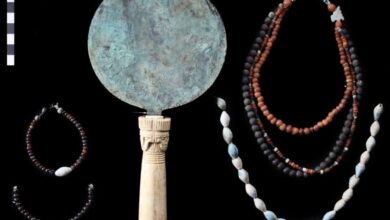Historians and cat-lovers alike will agree that the Egyptian Mau is a pretty unique feline. The reasons behind this are clarified by veterinarian Abdel Rahman Sameh Fahmy. “The Egyptian Mau has been around since the time of the Pharaohs, but its genes have been somehow preserved since then, even with the introduction of other breeds throughout history,” says Fahmy. “They were considered sacred cats at the time, and were worshipped and immortalized through many of the ancient Egyptians’ remaining artifacts and temples.”
Beyond their religious significance, Maus also exerted a noteworthy influence on Pharaonic fashion. “When you look at evidence documenting the way ancient Egyptian women dressed, you can see they wore necklaces similar to the natural markings around the collars of Egyptian Maus,” he says. “This influence is also echoed in the makeup worn at the time, which emphasized a certain eye shape resembling that of the Egyptian Mau.”
Given the high regard this breed of cat was once held in, it’s surprising that places like the Egyptian Mau Rescue Organization (EMRO), where Fahmy works, are necessary in modern day Egypt.
“People don’t seem to be aware anymore of just how special this breed of cat is,” sighs Fahmy.
Walking into EMRO’s headquarters in Moqattam, the level of devotion this center affords to Maus is immediately clear. The reception area’s shelves are crowded with Khan-al-Khalili-style souvenir figurines depicting the Mau in all its ancient glory, and numerous posters and anatomical charts decorate the walls. One Mau dozes comfortably on the printer, another at the foot of the desk. Even the clock hanging on the wall has little Mau cats instead of numbers.
Founded in 2004 by Gloria Lauris, a Canadian sociologist with a soft spot for the Pharaonic felines, EMRO has been caring for stray Maus with a commitment that can only be described as admirable. The cats are taken in, vaccinated and de-wormed if necessary, spayed or neutered, and given a comfortable home and a regular, healthy diet. Because of the unsanitary conditions these strays are forced to live in before rescue, endemic diseases are commonly spread between them, putting the entire breed at high risk. Furthermore, many Maus living on the street are intentionally poisoned by residents or store owners who simply don’t want cats on their property. Through its ongoing veterinary efforts and the message it tries to spread, EMRO is doing all it can to save the Mau from a tragic fate.
The rescue organization also operates as an adoption center, encouraging able cat lovers to give a permanent home to one or more of their many trained and vaccinated Maus. The process, though, is not as simple as just giving cats away. Potential adoptive owners have to fill out a surprisingly thorough application form and, if approved, EMRO doctors will follow up on each individual adoption, making sure their cats will not suffer any mishandling or abuse in their new homes. “We recently had to take a cat back after it was adopted,” Fahmy recalls. “It kept running away from the owner, and when she brought it in for a checkup, it had a broken leg. She clearly wasn’t taking good care of it, so we kept it.”
To help cover the sizeable costs required to provide a healthy home for stray Maus, the non-profit organization decided to open its veterinary clinic to the public three years ago, encouraging local pet owners to bring their cats, and even dogs, for checkups and operations, which seem to cost less at the rescue center than at most veterinary clinics. The same can also be said for their boarding, or “pet hotel” services, which come with a discount for longer stays. The center also accepts donations in any form – “even if it's an old sock for the cats to play with,” says Fahmy – and recently received a considerable annual endowment from renowned pet food manufacturer Purina.
Cat-lovers unable to provide a home to one of EMRO’ Maus can still help in other ways, by volunteering their services to the center, or even becoming ‘cat socializers,’ which basically means hanging out with the cats, playing with and entertaining them at the center.
With over 50 cats at any given time, the center itself is immaculately clean and run by staff who cherish the beautifully-marked creatures – the Mau is the only naturally spotted domestic cat in the world, according to Fahmy – to the point where they can immediately identify each cat by its given name, even by the briefest and most distant of glances. “That’s Ish-Ish,” says Julifer Jemenez, EMRO’s cheerful administrator, as she points to the bright orange Mau vigorously rubbing its head all over this reporter’s leg. “And that’s T-Rex,” she nods towards a pair of bright yellow eyes floating in a shadowy corner. Natcho was the one climbing the sewage pipes, and Saad s easy to point out, since he’s missing one of his front legs.
“Sometimes people will say things to us like, ‘look at the time, effort and money you spend on cats – wouldn’t it be better spent on humans?’” says Fahmy; a legitimate query considering Egypt’s large number of impoverished families. “My response to that is that there are literally thousands of human rights organizations operating in Egypt, and there are exactly 13 animal rights organizations, including us,” says Fahmy. “So, it’s a little disproportionate.”
“Look at all the soccer players we have who make ridiculous sums of money,” adds Fahmy. “Wouldn’t it make more sense to spend that money on more worthy causes, whether for human or animal rights?”
In the time they’ve been operating, EMRO’s volunteers have witnessed a small, but still significant, change in the public’s attitude towards stray Maus. “It’s been happening more frequently now that grocers and fruit vendors, for example, will bring the cats that hang out in front of their stores for checkups,” says Fahmy. “It’s encouraging to see.”
Hoping to further contribute to this positive phenomenon, EMRO have begun organizing summer courses and programs with different schools, which will allow students aged six to nine to come in and spend time with the cats, as well as learn about the basics of animal care. “They’d definitely learn more here than they would at the zoo,” argues Fahmy. “There’s certainly no animal rights whatsoever there.”
For more information, visit: http://www.emaurescue.org/




